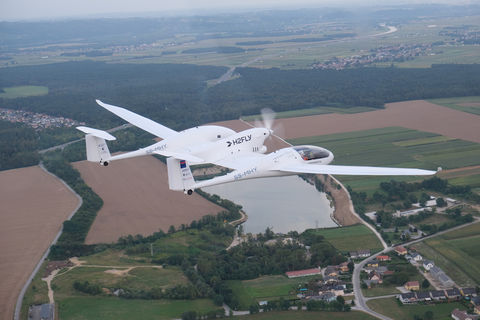Joby Subsidiary H2FLY Completes World’s First Piloted Flight of Liquid Hydrogen Powered Electric Aircraft
Joby Subsidiary H2FLY Completes World’s First Piloted Flight of Liquid Hydrogen Powered Electric Aircraft
SANTA CRUZ, Calif. & MARIBOR, Slovenia--(BUSINESS WIRE)--H2FLY, a wholly-owned subsidiary of Joby Aviation, today announced the successful completion of the world’s first piloted flight of a liquid hydrogen-powered electric aircraft.
H2FLY, acquired by Joby in 2021, continues to lead the industry on the development and testing of hydrogen aviation propulsion systems. The company completed a series of piloted flights with its HY4 demonstrator aircraft, including one that lasted more than three hours, fitted with a hydrogen-electric fuel cell propulsion system and liquid hydrogen that powered it for the entire flight.
The flights demonstrate the viability of using cryogenically-stored liquid hydrogen instead of gaseous hydrogen, which enables significantly lower tank weights and volume, leading to longer range. The successful installation and demonstration of flight with liquid hydrogen is believed to increase the range of H2FLY’s HY4 demonstrator aircraft from 466 mi (750 km) to 932 mi (1500 km), marking a critical step towards the long-term decarbonization of mid- to long-range aviation.
“H2FLY are pioneers in their field, and we’re proud of them achieving this watershed moment in the use of liquid hydrogen to power aircraft,” said JoeBen Bevirt, Founder and CEO of Joby Aviation. “In the years to come, battery-electric and hydrogen-electric propulsion systems will enable us to build aircraft that are quieter and make mid- to long-range air travel possible with zero emissions. It’s critical we take action now and invest aggressively in these technologies for the health of our planet and future generations to come.”
The successful flights are the culmination of Project HEAVEN, a European-government-supported consortium assembled to demonstrate the feasibility of using liquid hydrogen in aircraft. The consortium is led by H2FLY and includes the partners Air Liquide, Pipistrel Vertical Solutions, the German Aerospace Center (DLR), EKPO Fuel Cell Technologies, and Fundación Ayesa.
Following this test flight milestone, H2FLY will increasingly focus on its path to commercialization. In June, H2FLY announced the development of its new fuel cell systems, which will be capable of providing their full power range at altitudes high enough to enable commercial hydrogen-electric aircraft, demonstrating real-world commercial aircraft applications.
About Joby
Joby Aviation, Inc. (NYSE:JOBY) is a California-based transportation company developing an all-electric, vertical take-off and landing air taxi which it intends to operate as part of a fast, quiet, and convenient service in cities around the world. To learn more, visit www.jobyaviation.com.
Forward Looking Statements
This press release contains “forward-looking statements” within the meaning of the “safe harbor” provisions of the Private Securities Litigation Reform Act of 1995, including but not limited to, statements regarding the development and performance of our aircraft and our regulatory outlook, progress and timing; our business plan, objectives, goals and market opportunity; plans for, and potential benefits of, alternative fuel sources, such as hydrogen and the expected benefits and performance characteristics of such fuel sources; and our current expectations relating to our business, financial condition, results of operations, prospects, capital needs and growth of our operations. You can identify forward-looking statements by the fact that they do not relate strictly to historical or current facts. These statements may include words such as “anticipate”, “estimate”, “expect”, “project”, “plan”, “intend”, “believe”, “may”, “will”, “should”, “can have”, “likely” and other words and terms of similar meaning in connection with any discussion of the timing or nature of future operating or financial performance or other events. All forward looking statements are subject to risks and uncertainties that may cause actual results to differ materially, including: our ability to launch our aerial ridesharing service and the growth of the urban air mobility market generally; our ability to produce aircraft that meet our performance expectations in the volumes and on the timelines that we project, and our ability to launch our service; the competitive environment in which we operate; our future capital needs; our ability to adequately protect and enforce our intellectual property rights; our ability to effectively respond to evolving regulations and standards relating to our aircraft; our reliance on third-party suppliers and service partners; uncertainties related to our estimates of the size of the market for our service and future revenue opportunities; and other important factors discussed in the section titled “Risk Factors” in our Annual Report on Form 10-K, filed with the Securities and Exchange Commission (the “SEC”) on March 1, 2023, and in future filings and other reports we file with or furnish to the SEC. Any such forward-looking statements represent management’s estimates and beliefs as of the date of this presentation. While we may elect to update such forward-looking statements at some point in the future, we disclaim any obligation to do so, even if subsequent events cause our views to change.

